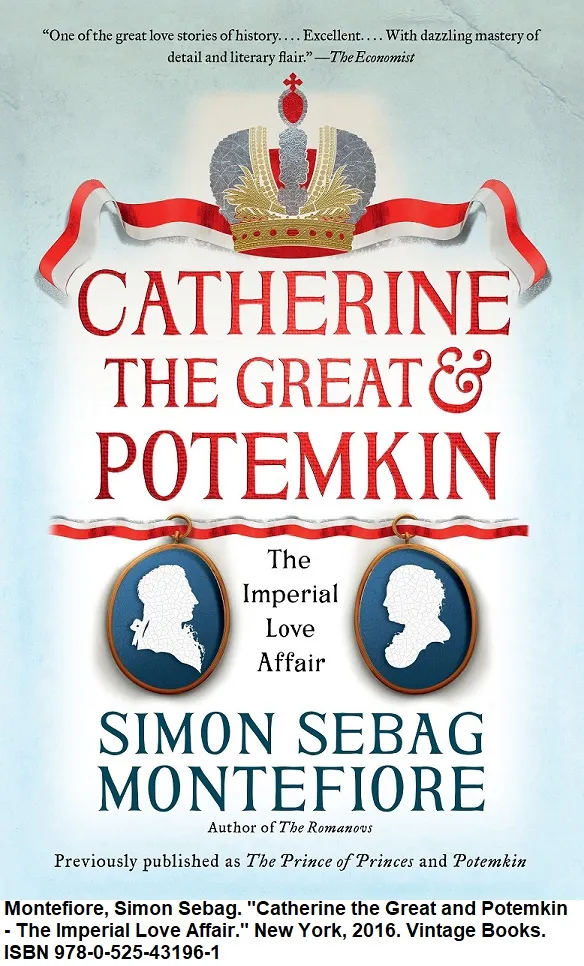2020 was "ye olde year o' Russian history" as far as my reading, and the emphasis was on one of history's most memorable couples: Catherine II and Grigory Potemkin. Having basically devoured everything I could find about the former, it was time to move on to the latter. Hence, Montefiore's parallel biography of the imperial couple.
Is this Book About Potemkin, or Catherine? Yes.
There seems to be a consensus among biographers of Field Marshall Potemkin that it's not even possible to discuss Potemkin in any context except as an extension of Catherine the Great. Even books that claim to be about Potemkin will use Catherine herself as the framework in which Potemkin's entire life fits, resulting in entire chapters where Catherine is the star and Potemkin gets a cameo. If you're a video gamer, it's as if Catherine was the core game and Potemkin was the expansion pack. And as thorough as this book is, it's no exception, which is perhaps manifested by its ever-changing title (it was once called "Prince of Princes: the Life of Potemkin," then was changed to simply "Potemkin," then adopted a title wherein the intended titular character gets second-billing to his empress).
For example, at the end of a brief first chapter outlining Potemkin's provincial Russian upbringing (with special emphasis on his Polish ancestry, which would become important later in his life), the author already introduces Catherine. The second chapter, entitled "Catherine's coup," treats Potemkin roughly the same way Marvel's "Agents of Shield" treats MCU characters: an occasional name-drop for continuity's sake, but no serious screen time.
In truth, it is ironic that the book is written in this way, because one of Potemkin's primary insecurities, even until his death, was the everpresent reminder that no matter what he achieved, it could be taken away by Catherine with a single stroke of a pen (or, as was more likely, by her death). It didn't matter to him that Catherine's heart was so utterly subjugated by him that she almost surely never would turn on him. The fact that she could was intolerable to him. This, in fact, became the largest source of tension between the empress and her de-facto emperor (p. 154, 155).
A Book as Big as Russia
If Robert Massie's biography of Catherine is the most exhaustive book on the "Minerva of St. Petersburg," then this book does the same for Potemkin. At 502 pages and another 132 pages of notes, it fills multiple definitions of the phrase "literary volume." Then again, considering that this is an individual so rarely given his own biography (I know of none in English other than this one and Soloveytchik's rather slim one), that's probably a good thing. There's a lot to write about here that simply wouldn't make it into a biography of his morganatic wife, Catherine. Details of Potemkin's dealings with England at a time when Catherine was opposed to getting involved with London get a chapter to themselves (295 - 311), and the John Paul Jones saga gets full attention later on in the coverage of "Potemkin's War" against the Turks in the 1780's.
In addition, the settling and development of Russia's southern provinces along the Black Sea, something that gets barely a nod in most bios of Catherine, is the focus for about a third of this book (which makes sense, considering it was the focus of much of Potemkin's life). Basically, the book comes in three roughly equal parts. Potemkin's youth, rise, fiery relationship with Catherine and its tempestuous end (complete with the peculiar arrangement wherein the two remained somewhat co-dependent partners but kept their distance) make up a third. Potemkin the builder of cities, makes up the second (with special attention given to his intent to add the Ottoman Empire to Russia's southern territories). The Second Catherinian Russo-Turkish War takes up the final third. This section, with all its accounts of sieges and sea battles, reads more like a novel than a biography, and herein lies the biggest difference between this book (the final word on Potemkin) and Massie's book (the largest volume about Catherine):readability.
Never a Dull Page
Bluntly speaking, there was never a moment when this book left me saying "shut up and get to the point." The chapters dealing with Potemkin's diplomatic intrigues read like a spy thriller. Pages about his opulent life and his seemingly endless collection of mistresses (usually his officers' wives) carry with them an otherworldly feeling of decadence somewhere between The Travels of Marco Polo and The Arabian Nights. Pages that address Potemkin's military campaigns are like novelization's of pirate movies.
And most importantly, despite introducing the reader to a cast that reads like a "who's who" of 18th century Hugh Hefners (Francisco de Miranda, Charles-Joseph de Ligne, Charles Nassau-Siegen), the book never ceases to be informative, and to let the reader know it. The way Potemkin is portrayed as a kind of "Genghis Khan in a tux," striding easily from victory to victory, thumbing his nose at his enemies while helping himself to their wives (along with any and every woman he desires along the way), leaving a trail in his wake not of burned cities, but of newly built ones, seems larger than life. And yet, every page is filled with footnotes and citations to show "yes, it DID happen that way."
So Who Should Read It?
Admittedly, it's not a small undertaking. I did mention that the book comes in at 502 pages, and did I mention those are pages of 8 point font? For a casual reader, this book represents a project of perhaps two months (for me, even with my voracious reading appetite, the act of constantly rushing to my bookshelf to cross-reference it with other books and make notes dragged it out to nearly three). But for anyone who is interested in Russia, or who wants to understand the pivotal phase of history at the end of the 18th century (the American and French Revolutions, the Pugachev revolt, the beginning of Ottoman decline, and the early military experiences of a young Corsican who sought to join the Russian Army against the Turks and was denied; too bad, young Captain Bonaparte), this book is a must.
But for the less scholarly reader...
...Here's a tale of a man who rose from humble provincial beginnings to be the most powerful man in Eurasia, altering the course of Western history, raising or razing cities with a word, toppling kingdoms and creating others at whim, while amassing glory, wealth beyond measure, and a harem of fawning and adoring women who thought the sun rose and set in his pants -and the empress of Russia was one of them for 17 years.
Got anything on your shelf more interesting than that?
Me either.

